No Matter What Is Reported On, It Still Results in Lying Fatties
As I was playing on Facebook before work today, I found a friend had posted a link to an article about chocolate and lower BMIs. Of course, I was interested because, as a candy maker, I’m always looking for a marketing angle. According to the article, 1,018 men and women between the ages of 20 and 85 were surveyed about their eating habits and weight. The people who reported eating more chocolate had a lower BMI.
There is one glaring issue about this study: researchers only used self-reported data.
But I don’t want to discuss this study’s methods. Rather, I want to talk about how it was reported.
Golomb and her team surveyed 1,018 men and women aged 20 to 85 years old about their weekly food intake. Those who reported that they ate chocolate more frequently had lower BMIs. Even more surprisingly, the lower BMI group did not report eating fewer calories or exercising more than their heavier counterparts in the study.
“That does not mean that you can eat unbounded amounts of chocolate,” Golomb says.
Right at the beginning of the article, we have the first “don’t take this as permission to gorge on chocolate” statement. Obviously, if the other health benefits of eating chocolate haven’t caused one to start gorging, this is the one thing that will push people over the edge. As it is obvious that people as a whole have no sense of self-discipline, ever. Especially not fat people.
“When I looked at this study, my first question was, ‘Did they exclude people who were not accurately reporting their diet?’” [Dr. Susan] Roberts wrote in an e-mail. “It is well known that people who are overweight or obese under-report their food intake, and what they under-report is the bad stuff.”
What she’s really saying there is that it’s well known that fat people are liars, especially about the “bad stuff.”
I want to be completely clear that food is not moral. There is no “good” or “bad” morality with food. There are choices that are more nutritionally dense and choices that are less nutritionally dense. But even a 200-calorie chocolate bar is not immoral. Not even if a person eats ten of them a day.
Roberts, director of the Energy Metabolism Laboratory at the USDA Human Nutrition Research Center on Aging at Tufts University, is also perpetuating the same trope of food being moral or immoral.
In other words, the higher BMI group could have under-reported their chocolate intake. Or the lower BMI group could have over-estimated the total number of calories they were eating.
“But having healthy constituents does not necessarily make the food good for weight control!” she wrote. “An example here would be cheese — it contains tons of calcium, but is not recommended as a panacea for obesity.”
The thing is, there is no panacea for obesity. Being overweight and obese is a complex issue. It’s not just “calories in, calories out,” as some would have us believe. If it was truly as easy as that, the recidivism rate would not be 95%.
Think of it: 95% of the people who go on a diet will gain all the weight back that they the lost, and usually a bit more. With all of the pills and powders and systems and surgical procedures out there, don’t you think the success rate* would be more than 5% if there was a panacea?
Being fat is not a choice, as this article implies when it suggests that overweight and obese people under-report their caloric intake. It is not a disease. It is not an addiction.
It is much more complicated than that, and articles like this one don’t really help to straighten out the misinformation that is out there.
*Success rate, for this discussion, means keeping off all the weight one lost for a period of five years after achieve one’s goal weight.








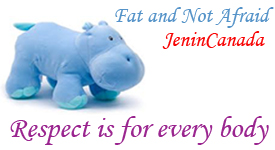

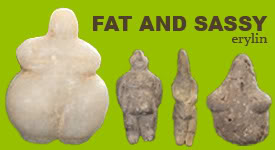
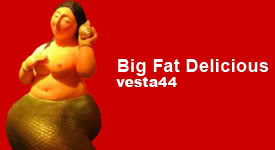




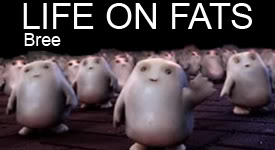



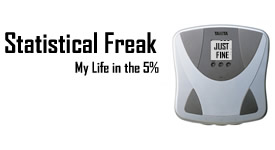


That’s one of the things I hate about being a fat person - how anything I say is automatically assumed to be a lie, no matter what it is, even if I have documentation to back it up. I’m still a liar simply because I’m fat and I couldn’t possibly know what the truth is about anything, especially if it’s related to food, weight, exercise, diet, or health. Which also means I’m stupid (even though I have an IQ of over 130, which is far from stupid, but there ya go, it’s impossible for a fatty fat fat mcfatterson to have any sort of intelligence or integrity, let alone moral compass).
This is true, I got in a discussion about obesity on an image board. I got called a troll, because I wasn’t letting the haters have their little fun in hating. Any documentation you provide about fat acceptance must have some catch to it. I post Big Fat Facts, and get “Oh I see, they’re trying to sell books!”
There simply is no talking to haters, they will find the most desperate ways of supporting their hatred.
It comes down to: “My mind is made up! Don’t confuse me with the facts!”
When we produce hard evidence, peer reviewed studies, and multitudes of studies that all say the same thing, we are messing with their world view. And unfortunately, many people have a very hard time with dealing with that.
Vesta, you are not only a liar, but you CHOOSE to be fat (sarcasm).
I just read a comment on another blog that was so offensive that I couldn’t even begin to answer it. Just to give you a little (vile) taste of what this idiot said:
“I’m sorry, but I don’t think it’s logical to say people don’t choose to be fat and then make a CHOICE to accept it.”
I used up all my sanity points today just reading this one comment.
And how about the old stand-by, “The only reason you are so pro fat is because you are fat, you wouldn’t be saying any of this if you were thin!” GRRRRRRRRRR I hate that. Thank you for writing this and at least there are some folks out there who aren’t questioning our integrity or motivation for believing in fat/size/self acceptance!